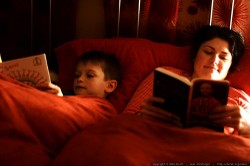As well as keeping all of the above in mind, I would recommend checking your work to ensure that you are not guilty of one of the following exposition no-nos.
Being too direct - For goodness sake, assume that your readers have brains. Don’t treat them like idiots. You can give them one and one, they’ll get two.
Forcing exposition into dialogue - This is a big problem in plays, but novel writers can also run afoul. Dialogue is a wonderful way to deliver necessary information, but, if done wrong, it can seem terribly clunky and awkward.
In my opinion, the best way to avoid that is to keep the ‘don’t be too direct’ rule in mind. In other words, if you have two characters who were once in a relationship, don’t go for a line of dialogue that explicitly states that fact:
“Well, Steve, it’s been two years since you walked out on me.”
Instead, try a subtler approach:
“Steve, it’s…err…it’s been a long time. You…umm…well, you look good.”
The hesitation indicates nervousness or awkwardness, that would not be present if the two had just been casual acquaintances. Not only can we surmise that the two were once lovers, but we can also assume that the breakup was certainly less than happy - but then, how many breakups are happy?
Writing pages of scene setting and character descriptions - No matter what form you’re writing in, no one wants to read reams of detail, most of which is irrelevant. By the end, your reader will have fallen asleep.
Not leaving room for imagination - Description, if done right, can be poetic, captivating and beautiful. It can offer a vivid image of what you want your reader to focus on, allowing him or her to see exactly what is in your mind’s eye.
However, be careful not to give excess scene setting for the sake of insisting that your reader see things the way you do. There’s nothing wrong with leaving some things to their imaginations. And, unless you’re Victor Hugo, chances are, you can’t sustain a reader’s attention for pages and pages of intricate exploration of Notre Dame Cathedral.
Placing importance on irrelevant things - I know, to you, the fact that your antagonist had a goldfish when he was six seems important; it’s incredibly revealing. However, it’s really not as important as you think it is. Creating lots of background for your characters is vital, because you have to get inside their heads. An audience member or reader, however, does not have to understand every nuance of behavior.
Exposition is all about providing information that is vital to the understanding of a literary or theatrical work. If you take nothing else away from this article, remember this: make it short, make it sweet, don’t force it, don’t give it all away at once and don’t feel that it has to be spelled out in black and white.

















 How to Avoid College Debton 07/31/2014
How to Avoid College Debton 07/31/2014
 Was Charlotte Bronte Jealous of her Sister Anne?on 07/15/2014
Was Charlotte Bronte Jealous of her Sister Anne?on 07/15/2014
 Whose Side is Cancer Research UK on?on 07/06/2014
Whose Side is Cancer Research UK on?on 07/06/2014
 A Plot Summary of Electra by Sophocleson 07/05/2014
A Plot Summary of Electra by Sophocleson 07/05/2014


Comments